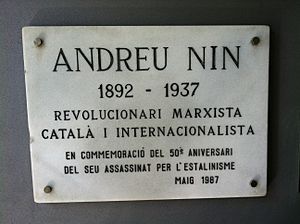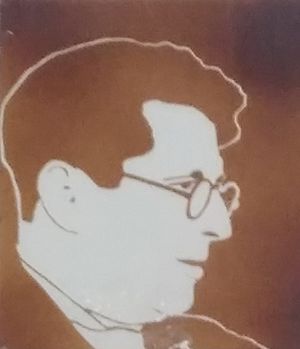Andreu Nin facts for kids
Andreu Nin Pérez (4 February 1892 – 20 June 1937) was a Spanish communist politician, translator and publicist. In 1937, Nin and the rest of the POUM leadership were arrested by the Moscow-oriented government of the Second Spanish Republic on trumped up charges of collaborating with Francisco Franco's Nationalists and were tortured to death by Soviet NKVD agents. On 17 June 2013, 76 years after his death, the Parliament of Catalonia officially paid homage to him and his work on politics with special emphasis on his work as Justice Minister of Catalonia.
Contents
Early life
Born in El Vendrell, Tarragona, to a poor family (his father was a shoemaker and his mother was a peasant), Nin moved to Barcelona shortly before World War I; he taught briefly in a secular anarchist school but soon became a journalist and activist. In 1917, he joined the Spanish Socialist Workers' Party (PSOE).
Nin became a leader of the Spanish workers' movement, and was among the founders of the Communist Party of Spain (PCE). He consequently worked for the Comintern and Red International of Labour Unions (RILU or Profintern) in the Soviet Union. While in Russia, he was won over to the Left Opposition which confronted Joseph Stalin's ascending faction within the Communist Party of the Soviet Union. He briefly worked as secretary to Leon Trotsky while in Russia. It was during this time he also began translating several of Trotsky's works into Spanish and Catalan.
Returning to Spain, Nin was instrumental in forming the Communist Left of Spain (ICE), the self-designated Trotskyist group affiliated to the International Left Opposition (ILO). However, the ICE was a small group and largely isolated. Nin had a number of disagreements with Trotsky in this period, specifically when Trotsky advised the ICE leader that entry into the Socialist Youth of Spain would augment the forces at their disposal, while Nin advocated forming a united party with the Workers and Peasants Bloc (BOC), a group coming out of the communist movement but seen as being on its right wing.
POUM
Eventually Nin broke with Trotsky and the ILO on this question, and the merger went ahead. Together with Joaquín Maurín, he formed the Workers' Party of Marxist Unification (POUM) in 1935, as a communist alternative to the Comintern-aligned PCE.
After the region of Catalonia saw its regional government, the Generalitat, reinstated by the Spanish Republic in the opening phase of the Spanish Civil War, Nin joined the devolved government headed by Lluís Companys, as regional minister of Justice. However, as Spain's communists gained sway in the Republican government, they moved to purge ex-communists and those independent of Moscow from the government, which would include POUM. Following a threat from Soviet consul Vladimir Antonov-Ovseenko to withhold Soviet aid, Companys sacked Nin from his cabinet on 16 December 1936, concluding a controversial tenure.
Arrest and disappearance

Following the violent May Days of Barcelona, on 16 June 1937, the government, under PCE pressure, declared POUM illegal. On the orders of Alexander Orlov, Nin and most of the POUM leadership were arrested and sent to a camp at Alcalá de Henares, near Madrid. Nin was tortured for several days under the supervision of the NKVD. Jesús Hernández Tomás, then a member of the Communist Party, and Minister of Education in the Popular Front government, later wrote:
Nin was not giving in. He was resisting until he fainted. His inquisitors were getting impatient. They decided to abandon the dry method. Then the blood flowed, the skin peeled off, muscles torn, physical suffering pushed to the limits of human endurance. Nin resisted the cruel pain of the most refined tortures. In a few days his face was a shapeless mass of flesh.
He was finally executed on 20 June 1937.
Health minister Federica Montseny was one of the first to raise the issue in public, asking, "Where is Nin?" following a lack of news about his detainment.
See also
 In Spanish: Andrés Nin para niños
In Spanish: Andrés Nin para niños


